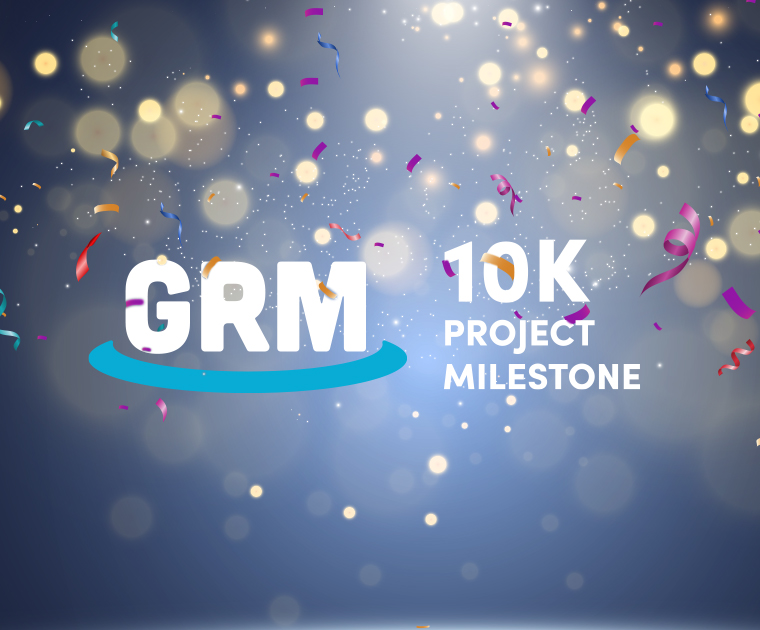We usually pride ourselves on uncovering data for our clients, but this month it was a piece of internal information that caught our attention! GRM had reached 10,000 projects! Congratulations to us!
GRM was founded by Dr Bill Peacock and Chris Jerram in 1991. Both had an unhealthy interest in collecting fossils and minerals from an early age, and subsequently studied Geology at University. Bill went on to obtain both an MSc and a PhD, specialising in engineering geology and site investigation, whilst Chris specialised in mining. In 1991, with a belief that they could provide a better more client focused service and a desire for a better work-life balance, Chris and Bill decided to go alone and established Ground Risk Management.
Over thirty years later GRM has grown to into a highly reputable national company delivering end to end services for developers and landowners across the UK. It has been a fantastic journey, as Bill recounts: “Chris and I employed our first geologist in the early 90’s to help us with fieldwork commitments, but we never imagined we’d grow GRM to our current size (50 staff) and scope. I’m not sure what happened to the planned ‘work-life’ balance either!”
One of the first projects for the newly formed company was for a developer wanting to buy an old farm and its land. Bill turned up to do the trial pits and could see that the site had had many investigation holes before. He found pig fat coagulated in sand and gravel. The land sale became somewhat contentious, and Bill ended up being a witness in the subsequent court case.
Perhaps the best result was for client who had a potential development site in Donisthorpe, Leicestershire: “He was going to walk away as the four boxes of environmental reports for the site made it look awful. We were asked what we thought. After sifting through all the boxes and reports we found a letter confirming that the majority of the hazards reported had been resolved during un-reported remediation works.”
Geoff Beckett joined GRM in 1998 and became a director in October 2016. He also shared some of his memories: “My first ever project was some ground investigation work for development at Gresley, Derbyshire, known as the Drum and Monkey estate due to the local pub of the time. It was a Coal Measures site, so mostly clay over shallow mudstone. We had to play ‘hunt the coal seam’ and differentiate between coal and dark mudstone whilst dodging a big foul sewer.
“One of my favourite projects was the Blue Lagoon at Bermuda Park in Nuneaton. It’s talked about in GRM’s Case Study Number 1. Through our work we were able to increase the land value for the client by defining the edge of a landfill, making sure all the waste was on the right side of the line, and putting in a gas vent trench and columns. This enabled a 50m no build zone to be reduced to the width of a road and pavement, adding about £1m to the value of the land! Naturally the client was delighted with our work!”
Bill and Geoff both agree that one of the most interesting projects was in Oldbury on what was to be fellow Director Richard Upton’s first largescale site for GRM. It was a complicated and challenging site that had been designated as contaminated land under Part 2a of the Environmental Protection Act (1990), primarily because of its potential to gas local residents. It was previously a colliery and clay pit which was filled with a mixture of colliery and clay pit waste, local industrial waste and topped off with domestic refuse and then used as sports pitches. We termed it the ‘pit of despair’ and fortunately, we didn’t find any of the glowing green barrels that the locals said were there! The team at GRM came up with a viable solution that included removing the domestic waste, engineering the remaining soils back in, constructing a complex gas management system, and grouting the mine shafts. The work was all approved by the EHO and the NHBC, and planning permission granted for the developer.
Finding the unexpected is something that the teams at GRM become accustomed to. But every now and again even we are surprised. Bill again: “My most unusual find in a borehole was a double decker bus buried in a Coventry landfill. We got through the roof, top seat, top floor, lower seat and then stopped on the axle. Bits of newspaper found at the same level were from the early 60’s.”
Asked about the next 10,000 projects, Bill replied: “I’m confident that GRM will still be going when we hit 20,000 projects, but I doubt very much that I will be here to see it!”
A timeline and summary history of GRM can be found on our website at https://www.grm-uk.com/about-us/history/
If you have any development or construction projects, then please get in touch to find out how we can help save both time and costs. Please use your main point of contact at GRM or for new enquiries email richard.upton@grm-uk.com or call 01283 551249.


